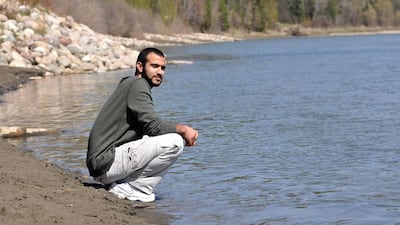Guantanamo's Child: Omar Khadr will make your stomach turn. Why the documentary upsets you will depend on your point of view.
Some will find it sickening that a terrorist, convicted of murder, was released from prison four months ago and now walks free in Edmonton, Canada.
Others will be disgusted by the tales of torture that Khadr went through as a teenager at Guantanamo, the notorious United States prison in Cuba.
It is also possible that you will find both reprehensible. Such is the moral ambiguity of the film, which has its premiere on September 14 at the Toronto International Film Festival, and features the first interview with Khadr since he was detained after a gun battle in Afghanistan in 2002.
“Some people say: ‘He seems so composed, relaxed, convincing and credible, and this really brought me closer to him,’” says Patrick Reed, who co-directed the film with Michelle Shephard. “Others say he’s composed, relaxed and comfortable and the guy’s obviously the master manipulator.
“The point of the film was to allow him to speak, for people to see him and to allow a dialogue about the issue. But it wasn’t necessarily to have everyone have the same opinion about him, because I don’t think even Michelle and I have the same opinion about him.”
Khadr was born in east Toronto to an Egyptian-born father, Ahmed, and mother, Maha, but the family moved to Afghanistan to start a charity. Soon after the 1980 Russian invasion, Ahmed met a young mujahideen named Osama bin Laden.
On September 11, this association – bin Laden even attended the wedding of one of Ahmed’s daughters – landed him on the United Nations terrorism list.
When the US invaded the following year, Ahmed decided that instead of allowing his family to return to Canada they would join him on the run. He was killed during the US invasion, but not before he volunteered his 15-year-old son as an Arabic translator to Al Qaeda-trained fighters. Guantanamo's Child includes footage of the teenager smiling while assembling and planting improvised explosive devices with his new companions.
“I wasn’t thinking about the morality of what I was doing,” Khadr says in the film. “It was for a cause: fighting invaders. People said this is what we should be doing, and I said: ‘Sure.’”
On July 22, 2002, US forces tracked down Khadr and his comrades at their compound and a shoot-out ensued. The US called in an airstrike, leaving all of the Al Qaeda soldiers dead. Khadr survived, but lost his left eye and had a hole in his chest. He was patched up and taken to a prison in Bagram, where he met “The Monster”. Damien Corsetti was assigned to be an interrogator as a punishment for getting alcohol poisoning. He had a deep voice, lots of tattoos and a penchant for throwing furniture. He accompanied Khadr three months later when he was transferred to Guantanamo. In the years that followed, Corsetti and others would use techniques such as the Human Mop (forcing prisoners to wipe up their own urine) and the Frequent Flier Programme (sleep deprivation by waking them up every two hours) on Khadr and even force-fed him after he joined a hunger strike in 2005.
Guantanamo's Child is the story of how a teenager dealt with this treatment – the Supreme Court of Canada released a 2008 video of Khadr crying for help from Canadian security officers – but it is also about how that teenager changed the perspective of people like Corsetti.
“Through the injustice of Omar, I started to see the error of my ways,” Corsetti says. “He helped me regain my humanity.”
Reed adds: “People might say: ‘Oh, another waterboarding story’ – but this film is also about seeing [Damien] change his mind on the war on terror, to see that transformation because of interactions with our main character.”
In 2005, Khadr became the only juvenile to be tried for war crimes. In 2010, he pleaded not guilty to murdering US Sergeant First Class Christopher Speer during the 2002 firefight. Three months later, he changed his plea. Despite the Canadian government’s objections, he was sent to Canada in 2012. Since his release in May, Khadr has lived with his lawyer, Dennis Edney. He wears an ankle bracelet and has a 10pm curfew – but he is free.
For Shephard, an award-winning journalist at The Toronto Star, the film is the culmination of 12 years of reporting. Producer Peter Raymont approached her to co-direct after reading her 2008 book about the case.
“After so long covering somebody, I finally got a chance to ask him my questions,” she says. “No matter what his answers were, it was going to be unsatisfactory on some level.”
artslife@thenational.ae

